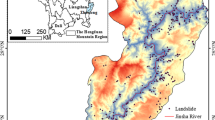Abstract
Most existing real estate appraisal methods focus on building accuracy and reliable models from a given dataset but pay little attention to the extensibility of their trained model. As different cities usually contain a different set of location features (district names, apartment names), most existing mass appraisal methods have to train a new model from scratch for different cities or regions. As a result, these approaches require massive data collection for each city and the total training time for a multi-city property appraisal system will be extremely long. Besides, some small cities may not have enough data for training a robust appraisal model. To overcome these limitations, we develop a novel Homogeneous Feature Transfer and Heterogeneous Location Fine-tuning (HFT+HLF) cross-city property appraisal framework. By transferring partial neural network learning from a source city and fine-tuning on the small amount of location information of a target city, our semi-supervised model can achieve similar or even superior performance compared to a fully supervised Artificial neural network (ANN) method.
Access this chapter
Tax calculation will be finalised at checkout
Purchases are for personal use only
Similar content being viewed by others
References
Antipov, E.A., Pokryshevskaya, E.B.: Mass appraisal of residential apartments: an application of random forest for valuation and a CART-based approach for model diagnostics. Expert Syst. Appl. 39, 1772–1778 (2012)
Arribas, I., García, F., Guijarro, F., Oliver, J., Tamošiūnienė, R.: Mass appraisal of residential real estate using multilevel modelling. Int. J. Strateg. Prop. Manag. 20, 77–87 (2016)
Bahrammirzaee, A.: A comparative survey of artificial intelligence applications in finance: artificial neural networks, expert system and hybrid intelligent systems. Neural Comput. Appl. 19, 1165–1195 (2010)
Benjamin, J.D., Guttery, R.S., Sirmans, C.F.: Mass appraisal: an introduction to multiple regression analysis for real estate valuation. J. Real Estate Pract. Educ. 7, 65–77 (2004)
Born, W.L., Pyhrr, S.A.: Real estate valuation: the effect of market and property cycles. J. Real Estate Res. 9, 455–485 (1994)
Brown, K.H., Uyar, B.: A hierarchical linear model approach for assessing the effects of house and neighborhood characteristics on housing prices. J. Real Estate Educ. 7, 15–24 (2004)
Cervelló, R., García, F., Guijarro, F.: Ranking residential properties by a multicriteria single price model. J. Oper. Res. Soc. 62, 1941–1950 (2011)
Chiarazzo, V., Caggiani, L., Marinelli, M., Ottomanelli, M.: A neural network based model for real estate price estimation considering environmental quality of property location. Transp. Res. Procedia 3, 810–817 (2014)
Chopra, S., Thampy, T., Leahy, J., Caplin, A., LeCun, Y.: Discovering the hidden structure of house prices with a non-parametric latent manifold model. In: ACM International Conference on Knowledge Discovery and Data Mining (KDD) (2007)
D ’amato, M.: Comparing rough set theory with multiple regression analysis as automated valuation methodologies. Int. Real Estate Rev. 10, 42–65 (2007)
Del Giudice, V., De Paola, P., Forte, F.: Using genetic algorithms for real estate appraisals. Buildings 7, 31 (2017)
Downes, T.A., Zabel, J.E.: The impact of school characteristics on house prices : Chicago 1987–1991. J. Urban Econ. 52, 1–25 (2002)
Fan, G.Z., Ong, S.E., Koh, H.C.: Determinants of house price: a decision tree approach. Urban Stud. 43, 2301–2315 (2006)
Farmer, M.C., Lipscomb, C.A.: Using quantile regression in hedonic analysis to reveal submarket competition. J. Real Estate Res. 32, 435–460 (2010)
Ferreira, E.J., Sirmans, G.S.: Ridge regression in real estate analysis. Appraisal J. 56, 311 (1988)
Fu, Y., Xiong, H., Ge, Y., Yao, Z., Zheng, Y., Zhou, Z.H.: Exploiting geographic dependencies for real estate appraisal: a mutual perspective of ranking and clustering. In: ACM International Conference on Knowledge Discovery and Data Mining (KDD) (2014)
Goldberg, D.E., Holland, J.H.: Genetic algorithms and machine learning. Mach. Learn. 3, 95–99 (1988). https://doi.org/10.1023/A:1022602019183
Isakson, H.R.: Using multiple regression analysis in real estate appraisal. Appraisal J. 69, 424 (2001)
Kanojia, A., Khan, M.Y., Jadhav, U.: Valuation of residential properties by hedonic pricing method-a state of art. Int. J. Recent Adv. Eng. Technol. (IJRAET) (2016)
Kauko, T.: Residential property value and locational externalities: on the complementarity and substitutability of approaches. J. Prop. Invest. Financ. 21, 250–270 (2003)
Kempa, O., Lasota, T., Telec, Z., Trawiński, B.: Investigation of bagging ensembles of genetic neural networks and fuzzy systems for real estate appraisal. In: Nguyen, N.T., Kim, C.-G., Janiak, A. (eds.) ACIIDS 2011. LNCS (LNAI), vol. 6592, pp. 323–332. Springer, Heidelberg (2011). https://doi.org/10.1007/978-3-642-20042-7_33
Kontrimas, V., Verikas, A.: The mass appraisal of the real estate by computational intelligence. Appl. Soft Comput. J. 11, 443–448 (2011)
Mansfield, J.R., Lorenz, D.P.: Shaping the future: the impacts of evolving international accounting standards on valuation practice in the UK and Germany. Prop. Manag. 22, 289–303 (2004)
Mccluskey, W., Anand, S.: The application of intelligent hybrid techniques for the mass appraisal of residential properties. J. Prop. Invest. Financ. 17, 218–239 (1999)
Musa, A.G., Daramola, O., Owoloko, A., Olugbara, O.: A neural-CBR system for real property valuation. J. Emerg. Trends Comput. Inf. Sci. 4, 611–622 (2013)
Narula, S.C., Wellington, J.F., Lewis, S.A.: Valuating residential real estate using parametric programming. Eur. J. Oper. Res. 217, 120–128 (2012)
Nghiep, N., Al, C.: Predicting housing value: a comparison of multiple regression analysis and artificial neural networks. J. Real Estate Res. 22(3), 313–336 (2001)
Pagourtzi, E., Assimakopoulos, V., Hatzichristos, T., French, N.: Real estate appraisal: a review of valuation methods. J. Prop. Invest. Financ. 21, 383–401 (2003)
Author information
Authors and Affiliations
Corresponding author
Editor information
Editors and Affiliations
Rights and permissions
Copyright information
© 2019 Springer Nature Singapore Pte Ltd.
About this paper
Cite this paper
Guo, Y., Lin, S., Ma, X., Bal, J., Li, Ct. (2019). Homogeneous Feature Transfer and Heterogeneous Location Fine-Tuning for Cross-City Property Appraisal Framework. In: Islam, R., et al. Data Mining. AusDM 2018. Communications in Computer and Information Science, vol 996. Springer, Singapore. https://doi.org/10.1007/978-981-13-6661-1_13
Download citation
DOI: https://doi.org/10.1007/978-981-13-6661-1_13
Published:
Publisher Name: Springer, Singapore
Print ISBN: 978-981-13-6660-4
Online ISBN: 978-981-13-6661-1
eBook Packages: Computer ScienceComputer Science (R0)




